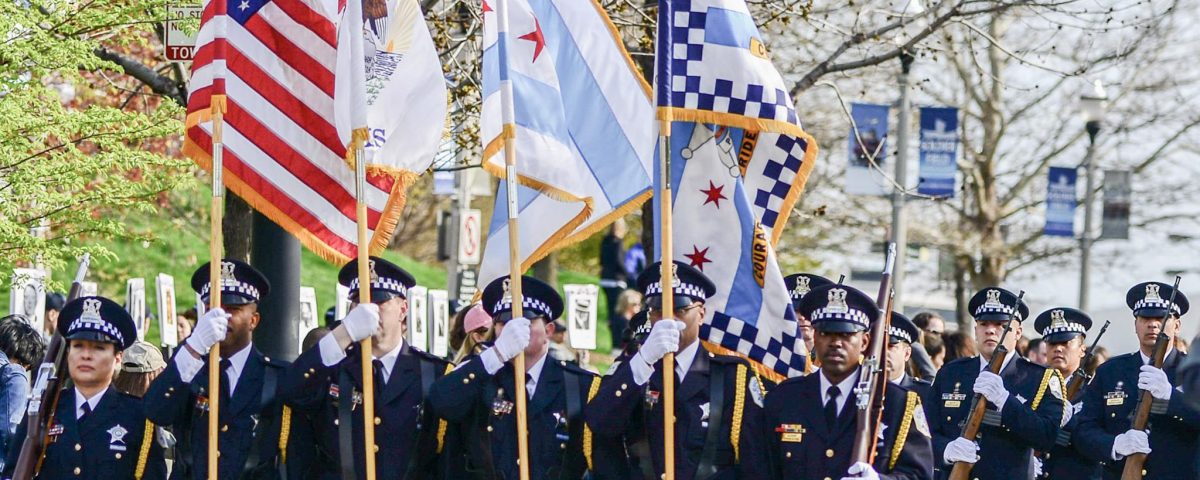
Why Civic Consulting Alliance is investing in helping the Chicago Police Department redefine policing as community policing

Cross-sector collaborations: A recipe for success
November 26, 2024Why Civic Consulting Alliance is investing in helping the Chicago Police Department redefine policing as community policing

Civic Consulting Alliance staff are leading a year-long project to operationalize community policing across the Chicago Police Department (CPD) so that community policing is synonymous with policing in Chicago.
This multi-phase project* will develop a clear department-wide vision that integrates community input, CPD member perspectives, national best practices, and change management expertise. We will deliver a clear implementation roadmap that integrates the vision and values of community-oriented policing throughout all Department operations. In addition to supporting internal phases of work, Civic Consulting Alliance helped community engagement partners host nearly 30 community engagement sessions across Chicago.
Redefining community policing as a department-wide philosophy is a shared goal of many Civic Consulting Alliance clients, including the Partnership for Safe & Peaceful Communities, the Civic Committee of the Commercial Club of Chicago’s Public Safety Task Force, and the Mayor’s Office of Community Safety.
In the meantime, Civic Consulting Alliance hopes to help reground you with what we mean when we talk about community policing and why it matters. Below is a list of frequently asked questions about Civic Consulting Alliance’s role in supporting the Chicago Police Department in this effort.
*details in Appendix
What is community policing, and why is it so important?
Members of the Chicago Police Department face incredible challenges every day in combating violence. At the same time, community trust is key to ensuring community members are comfortable cooperating in police investigations and violence reduction efforts. The community policing philosophy emphasizes collaboration between police and community members to build trust and solve community problems. The goal is to be proactive in strengthening safety through trust and partnership, rather than reactive when crime occurs.
Building community trust is essential to building a safer Chicago for all. Research shows that increased community trust positively impacts crime prevention and can support strong homicide clearance rates. It also sets expectations for what “lawful and constitutional” policing looks like, and works to restore community trust at a time when Chicago taxpayers spent at least $107.5M to resolve police misconduct lawsuits in 2024 related to false arrest, excessive force, extended detention, malicious prosecution and illegal search or seizure.
When implemented effectively as a department-wide philosophy, each neighborhood will feel they have an appropriate level of interaction with police (not over-policed or under-policed), and people will be empowered to work with the police. For CPD, this means each member has the tools and training to meaningfully engage in those communities. This will help police better address community challenges and provide support during difficult situations, such as domestic violence, while minimizing additional trauma that police intervention can cause.
Given the many challenges facing officers, why is community policing a top priority for the Chicago Police Department and Civic Consulting Alliance?
- Fully integrating community policing is a goal of the consent decree and a foundation of CPD’s public safety efforts. In 2017, the Department of Justice confirmed that CPD had a “pattern or practice” of systemic, unconstitutional behavior. Since 2019, CPD has been under a consent decree to implement constitutional policing reforms that will keep police and community members safer. One of the mandates is that both sworn officers and civilian employees be responsible for making community policing a core component of its programs, training, resource deployment, and accountability systems.
- Independent reviews of CPD practices have identified failures to protect and serve all Chicago residents equally and fairly: Black and Latine communities have experienced racially discriminatory policing. The independent monitor (IMT) responsible for evaluating consent decree progress released a special report in 2022 on the disparity between CPD interactions with the population as a whole and its interactions with young Black men ages 18–25. One of the themes the IMT identified in its Report was the “feeling that CPD officers often fear ordinary community residents, which then leads to excessive police responses.” The Illinois Office of the Attorney General also found that many CPD officers expressed fear about working in neighborhoods and districts they did not know, at the cost of the opportunity to engage with community members, build relationships, or solve the problems brought to them by the residents.
- Operationalizing community policing is a formal goal of Superintendent Larry Snelling: In 2024 and 2025, Superintendent Snelling recommitted that “every officer is a community policing officer” in his annual goals to the Community Commission for Public Safety and Accountability. In 2024, the Superintendent sought two broad outcomes: (1) a cultural shift to a more expansive approach to community policing for all police officers and (2) to develop a community policing plan. The 2024 assessment, a Civic Consulting Alliance deliverable from our current work, was extended to ensure comprehensive community engagement. In 2025, the Department will provide updates on the assessment results as well as develop implementation plans (a future Civic Consulting Alliance phase of work that would benefit from pro bono partner support).
How has community policing changed public perception in Chicago since its implementation more than three decades ago?
CPD introduced community policing into its operations in the 1990s. Police responded to escalating violence and drug use by creating the Chicago Alternative Policing Strategy, or CAPS. Through that strategy, officers interacted regularly with people in their beat and held local meetings to exchange information with residents
According to the Department of Justice, Studies found that strategies like CAPS had a substantial impact on public safety and community confidence in CPD. Researchers found, for example, that Black residents experienced a 22% decrease in fear of crime in their neighborhoods and a 60% decrease in perceived social disorder. At the same time, Black, Latine, and White Chicagoans all reported better relationships with police officers.
Since the 1990s, other cities with high violent crime rates have innovated on the CAPS model, successfully reduced crime, and rebuilt trust. For example, New York reduced its crime rate while lowering the number of stops and arrests it makes.
How has community policing in Chicago evolved over time?
Chicago’s original CAPS community policing model has experienced challenges maintaining its initial momentum. Community policing responsibilities are assigned to specific CPD members, leading to a perception that only those officers are responsible for implementing community policing goals. As a result, attitudes toward programs like CAPS have shifted, and some police officers and community members view them as ineffective.
Efforts to rethink and modernize community policing have not been widely adopted due to many factors, including that CPD has had four Police Superintendents in the past four years.
One important innovation is the creation of the Neighborhood Policing Initiative (NPI), which has been piloted in some police districts, but CPD faced challenges scaling this model department-wide.
Many elements from CAPS and NPI reflect foundational ways of systematically implementing and operationalizing community policing. However, Chicago’s unique challenges and opportunities require an updated vision and roadmap that ensures community policing that is embedded throughout all Bureaus and roles in the Department.
How is this effort different from other community policing iterations?
Operationalizing department-wide community policing is critical to the success of CPD Superintendent Larry Snelling’s change management agenda, and a shared goal of leaders in the public, private, and philanthropic sectors.
Superintendent Snelling is the first CPD leader chosen by the Mayor as part of a new community-driven Superintendent search process led by the Community Commission for Public Safety & Accountability. The Superintendent has the support of the rank-and-file officers, the business community, and philanthropy. This broad base of support is a rare moment to realize the long-sought-after goal that a CPD-wide approach to community policing will create a safer Chicago for those who live, work, and visit here.
Appendix
How is Civic Consulting Alliance Operationalizing Community Policing?
Civic Consulting Alliance is facilitating the operationalizing of Chicago Police Department’s community policing vision through several phases that began in May 2024.
- Phase 1 (May – August 2024): Engaged CPD members across the Department to understand their current perceptions of community policing as well as implications of community policing as a department-wide philosophy.
- Phase 2 (September 2024 – March 2025): Collaborated with national experts to identify best practices for CPD and provided project management for CPD to work with skilled facilitator to engage 8 community-based organizations to gather community perspectives across Chicago.
- Phase 3 (September 2024 – March 2025): Analyzed current roles, responsibilities and time allocations of specialized CPD community policing personnel.
- Phase 4 (March – September 2025): Will develop and support CPD to execute a comprehensive internal and external stakeholder engagement approach, including community engagement and in collaboration with partners, and synthesize feedback to finalize the CPD vision and inform operational changes for effective community policing.
- Phase 5 (April – Fall 2025): Will assess current CPD operations against the Superintendent’s vision to identify strengths and opportunities, recommend changes, and develop a comprehensive change management strategy with a corresponding implementation roadmap covering organizational structure, workforce, training, accountability, budget, and communication.
What other impact has Civic Consulting Alliance achieved related to police reform?
Civic Consulting Alliance is uniquely positioned to effectively and swiftly support CPD in operationalizing community policing throughout the department. We have a significant track record of successful work across the public safety ecosystem.
Investments in operational reforms and policy changes within the Chicago Police Department since 2017:
- In 2017, co-developed an implementation plan to launch “Next Steps for Reform,” which included improving training for officers; as a result, nearly all 12,000 officers receive training on the revised Use of Force Policy. Developed a public-facing Strategic Plan, and established project management infrastructure to manage implementation; as a result, CPD created a new Office of Reform Management to sustain this infrastructure.
- Between 2018 and 2020, focus shifted to executing the aforementioned roadmap of operational reforms. Equipped the Office of Community Policing with a governance model and operations to support each district to develop community policing strategic plans. Developed the Performance Evaluation System to ensure officer growth and accountability in community policing, impartial policing, effective use of de-escalation, and constitutional policing.
- In 2021 and 2022, accelerated reform efforts by providing strategy development and project management for the execution of Reform Pilots in District 6 (Gresham), and supported initiatives to address pain points. Equipped CPD with messaging, engagement strategy, and implementation plan to drive internal Reform Communications that further strengthen Department-wide understanding and support for reforms.
- In early 2022, Civic Consulting Alliance also helped stand up the new Community Commission for Public Safety & Accountability(Community Commission), which gives community members powerful new tools to provide oversight of the Chicago Police Department, the Civilian Office of Police Accountability, and the Police Board. We then helped the Community Commission outline a process for recruiting and selecting CPD Superintendent candidates, which was leveraged to select current Superintendent Larry Snelling.
What is a consent decree?
A consent decree is a comprehensive agreement containing a set of institutional changes to guide the reform of law enforcement agencies that demonstrate a “pattern or practice” of systemic, unconstitutional behavior that violates Constitutional or federal rights, for example, racial profiling or excessive use of force. This level of action is “reserved for the most serious cases.”
Of the more than 18,000 law enforcement agencies in the United States, only 70 investigations have occurred since 1994, and 41 resulted in consent decrees or settlement agreements over the same period. An independent monitoring team (IMT) monitors the progress of the Consent Decree.
Chicago’s consent decree was approved and Independent Monitoring Team launched in 2019. More on CPD’s approach, progress and opportunities for feedback here.
